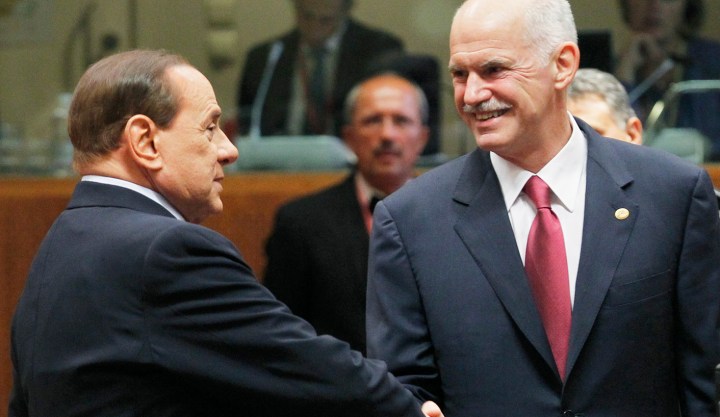Newsdeck
Why are Greek and Italian politicians so bad?

In Greece, conservative leader Antonio Samaras insisted on calling an election earlier this month that slashed his own party's share of the vote and set the country down a path that could see it crashing out of the euro. By Barry Moody
In Italy, politicians led by scandal-plagued premier Silvio Berlusconi were forced to admit they could not handle a crisis that brought the country close to financial catastrophe last year and handed over to technocrat Mario Monti to save the day.
These are just some of the bungles by widely despised politicians in Greece and Italy as people cry out for strong leadership in their hour of greatest need, raising the question why these leaders have failed so spectacularly.
Politicians in Athens have spent most of the time since the May 6 election squabbling furiously instead of finding a way out of a menacing impasse, forcing the country into a new and highly unpredictable election next month.
Samaras’s New Democracy party and the Socialists of PASOK, who jointly dominated Greece for nearly 40 years, saw their vote slashed from 77% to 32% on May 6 after a disastrous campaign. Charismatic leftist Alexis Tsipras made huge gains at their expense by opposing an EU/IMF bailout.
“In terms of strategy and campaigning, it was awful,” says Costas Panagopoulos of ALCO pollsters.
Even now they are showing little inclination to explain that the repeat poll on June 17 will be a stark choice between staying in the euro or being kicked out, although such a message has the potential to bring votes back to the traditional parties from those who supported Tsipras in the first poll.
In local elections this month, Italians delivered a major slap in the face to traditional parties, particularly the centre-right alliance that sustained Berlusconi, and gave unprecedented success to a protest group led by shaggy-haired comic Beppe Grillo, who calls politicians “diarrhoea”.
Berlusconi’s numerous scandals, topped by the lurid “Rubygate” sex affair, paralysed his ability to fight off the euro zone debt crisis that had started in Greece and forced the great showman to finally hand over to Monti last November.
All the big parties in Italy are currently stained by major corruption scandals and the separatist Northern League – a key ally of Berlusconi – has been devastated by an investigation of eye-popping graft inside a party founded to combat corruption.
ANCIENT CIVILISATIONS
Why have Greece and Italy, cradles of two great ancient civilisations – the first of which invented democracy – been so badly served by their modern politicians at such a crucial time?
The answers are both modern and historic, in some cases going back centuries.
What is undoubted is that in both countries, traditional politicians are finally suffering the wrath of populations which have hitherto complacently voted for them, as the economic crisis creates deep suffering among ordinary people.
This has brought the prospect, at least, of real change.
“The problem is they’ve never had a real job – they’ve never had to earn a living so they haven’t got a clue about society. They have no values and all they care about is collecting their little salary. They’re rotten to the bone. That’s our misfortune,” said Greek taxi driver Nikos Kremidas, 60.
An opinion poll on Tuesday showed the protest group led by Grillo, who calls Italy’s premier “Rigor Montis”, had pushed Berlusconi’s once dominant PDL party into third place for the first time since it was formed in 2008.
Italian parties are scrambling to find new, more saleable, identities before elections next year, but, ominously for Monti, distancing themselves from his unpopular austerity policies.
Likewise, ALCO’s Panagopoulos said that whatever the result of the June 17 election in Greece, the formerly dominant centrist parties must change or die. “If they remain as they are now, this will be the end for both parties.”
Many Greeks voted on May 6 to punish these parties for decades of corruption and incompetence as well as the suffering imposed in exchange for a bailout that is keeping Greece afloat.
In both Italy and Greece corruption fed by the sums needed to conduct politics in the age of television and the proceeds generated from selling state assets, combined with rigid party structures, have helped create self-serving political classes.
CLIENTELISM
So too have a system of clientelism or patronage that has its roots in the 19th century and beyond and the more recent “death of ideologies” following the end of the Cold War, robbing parties of the basic beliefs that drove them for decades.
Clientelism has been traced right back to ancient Rome and was also widespread in the 19th century, even before Italy was created. It was strengthened after World War II when illiterate voters were easily manipulated by politicians.
The exchange of favours for votes was so blatant that rural voters were sometimes given one shoe or half a torn banknote before an election, to be redeemed after the correct vote.
In both Italy and Greece, these historical factors have been perpetuated by more modern developments.
Italy’s parliament has for years debated changing an electoral law whose own inventor called it “junk”. It reinforces the power of party leaders, and encourages fragmentation and often incompatible coalitions.
Sergio Romano, an influential commentator and former Italian ambassador to Moscow, said the “Clean Hands” graft scandal in the early 1990s prevented Italy developing like other countries after the fall of Communism because it destroyed both the dominant Christian Democrat party and the Socialists.
“The course of Italian politics after the end of the Cold War was different from any other democratic country in western Europe,” he told Reuters.
On the right, flamboyant media billionaire Berlusconi burst into the vacuum and on the left the new Democratic Party was formed from former Communists and leftwing Christian Democrats.
“This was liking mixing oil and water,” Romano said.
He added that Berlusconi’s 17 years of dominance until last year further contributed to political paralysis because he was constantly concerned with passing laws to escape legal troubles, making bargains with politicians protecting their own interests.
Rigid party structures in Italy and Greece have also favoured the rise of machine politicians rather than charismatic leaders and blocked off more talented newcomers.
“Party hacks have rarely come to the top in the United States, whereas here with the exception of Berlusconi and a few others, you have always had party hacks,” said Professor James Walston of the American University of Rome.
“You have so much power in the parties that it allows much less flexibility for individual leaders.”
“YOU MUST BE CORRUPT TO SURVIVE”
Greece’s problems have many similarities with Italy, right down to strong party structures and inbuilt graft. “The problem is that the people who enter politics in Greece have to become corrupt in order to survive,” said political commentator Nikos Dimou.
“A person who is honest and forthright and does not play these kind of games hasn’t got much chance to survive in the Greek political arena.”
Dimou said the system of patronage had deep historical roots like in Italy, dating back to the 500 years that Greece spent under the dominance of the Ottoman Empire.
The system was perpetuated and deepened after the end of a military junta in Greece in 1974. “New classes of people came into politics and these people, let’s put it mildly, they were hungrier,” Dimou told Reuters.
The period also began the dominance of political families like the Papandreous, whose scion George was toppled as PASOK boss last year because of his erratic handling of the crisis.
“Our politicians are not only corrupt, they are of a rather low level as far as their culture, their intelligence, their abilities … they have never worked in their lives, they have no idea how let’s say financial or social problems work and they get appointed to govern the country without having governed a small company or even a little store,” Dimou said.
In the case of the recent election in Greece, the major parties were eclipsed by Tsipras, even though his platform of rejecting the international bailout while still remaining in the euro has been dismissed as impossible by European leaders.
Although the two countries have similar problems, analysts say Italy at least had the flexibility to appoint a respected technocrat government for the second time in 20 years, something Greece’s politicians rejected.
And yes, even that has historical roots. Monti has likened himself to a “podesta straniero” – outside rulers brought in by squabbling city states in the Middle Ages to rule temporarily when they were paralysed by disputes. DM
Photo: Italy’s Silvio Berlusconi and Greece’s George Papandreou chat at the start of an European Union leaders summit in Brussels June 23, 2011. REUTERS/Thierry Roge




















 Become an Insider
Become an Insider